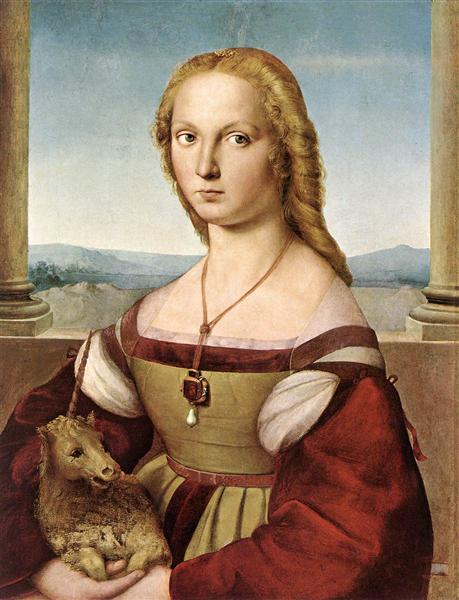Kuvaus
Raphael's Portrait of a Lady with a Unicorn, painted in 1506, stands as one of the most remarkable manifestations of the Italian Renaissance, encapsulating both the artist's technical mastery and the rich symbolism of the era. Often capturing the attention of both audiences and critics, this work offers an intimate and complex look at the elegance and nuances of Renaissance portraiture, while revealing much about the aesthetic and cultural values of its time.
The composition of the painting reflects an exceptional mastery of portraiture technique. The lady, presented in the foreground, seems to come to life through the delicacy of her facial features and the luminosity of her skin. The use of sfumato and the soft modelling of shadows allow the figure to glide almost ethereally forward, creating a tangible connection with the viewer. The unicorn, which is positioned at the bottom of the portrait, becomes a symbol that adds a layer of meaning; in the iconography of the period, it was frequently associated with purity and virginity, a quality that underlines the idealised representation of women.
The color palette is a harmonious ballet of warm and cool tones that compete for attention, but are perfectly integrated within the work. The darker, more diffuse background serves to highlight the luminosity of the lady's dress, which is characterized by an elaborate brocade that suggests wealth and sophistication. This visual contrast accentuates the central figure and focuses the viewer's gaze on her face, where skillfully painted hands hold the belt of her dress, providing a subtle element of action that brings the portrait to life.
A fascinating aspect of this work is the mysterious identity of the lady. Over the years, various experts have speculated on who she might be, although there is no consensus. Some theories suggest that she could be a noblewoman of the court, which reinforces the pinnacle of society she represents and suggests an elevated status. In addition to her refined demeanor, the lady's gaze is enigmatic, offering a mix of serenity and introspection that invites contemplation.
This portrait also dialogues with other works by Raphael and his contemporaries. Compared to the Portrait of Baldassare Castiglione, also by Raphael, one can observe similarities in the representation of human figures in natural poses and the predominant attention to clothing as a reflection of social status. However, the inclusion of the unicorn in this portrait makes it stand out in Raphael's universe, imbuing the work with a symbolic charge that abounds in the art of the time.
Thus, the “Portrait of a Lady with a Unicorn” not only reveals itself as a masterpiece of portraiture, but through its composition, colour and symbolism, it becomes an invaluable testimony to Renaissance aesthetics. This piece remains a source of fascination and a reminder of Raphael’s genius, whose ability to capture the human essence on a single canvas has secured his place in the canon of art.
KUADROS ©, a famous painting on your wall.
Hand-made oil painting reproductions, with the quality of professional artists and the distinctive seal of KUADROS ©.
Painting reproduction service with satisfaction guarantee. If you are not completely satisfied with the replica of your painting, we will refund 100% of your money.

